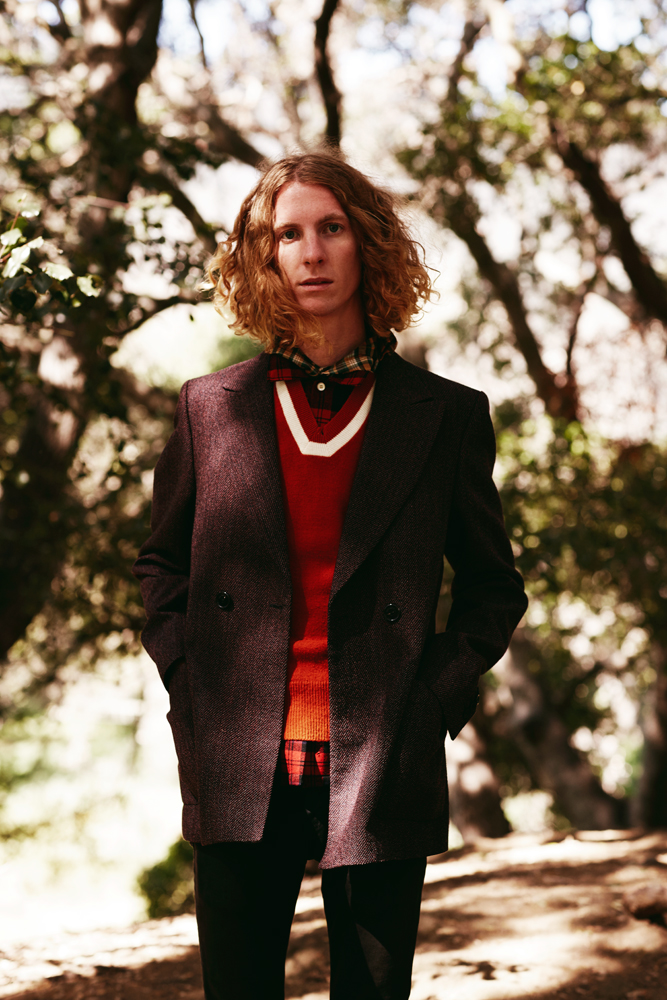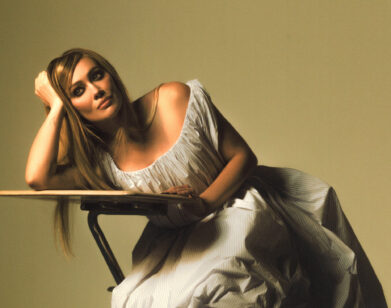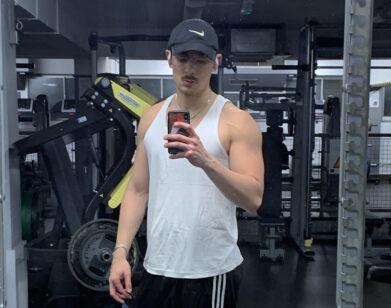Methyl Ethel’s Chemistry
METHYL ETHEL IN LOS ANGELES, APRIL 2016. PHOTOS: GUY LOWNDES. STYLING: RITA ZEBDI/JED ROOT. GROOMING: NIKKI PRODIVDENCE USING R+CO.
In 2013, Jake Webb founded Methyl Ethel as a solo act, aiming to bring his bedroom-made sounds into the ears of others. He soon released two EPs (Guts and Teeth) under the moniker, which finds its roots in his father’s previous job manufacturing fiberglass. (Methyl ethyl ketone peroxide is used to make fiberglass, and in condensing the chemical compound and changing the spelling of “ethyl,” Webb hoped to cerate a unique identity and personality.) As buzz began to grow surrounding his music, however, the musician realized he needed a proper band and thus brought in his longtime friend Thom Stewart on bass and sound engineer Chris Wright on drums.
Webb first met Wright when working on Methyl Ethel’s debut LP, Oh Inhuman Spectacle. He had written and recorded nearly the entire album, but then brought it to Wright, who helped expand Webb’s thought process and further develop songs. In June 2015, the three Perth, Australia natives released Oh Inhuman Spectacle worldwide via 4AD, and following a successful run at 2015’s CMJ festival in New York, Methyl Ethel soon found themselves supporting Courtney Barnett. Beginning today, the trio will bring their fuzzed-out, dream-pop sounds to the likes of London, Paris, Amsterdam, and Barcelona as part of their first European headlining tour, with support from fellow Australian duo Slum Sociable.
EMILY MCDERMOTT: You grew up listening to a lot of tapes in the car, and listening to semi-melted warped tapes led you to the current sound of Methyl Ethel. Can you tell me about what you would listen to, your early influences?
WEBB: My folks come from an age of records and cassette tapes, so a lot of their collection came from when they were growing up and dubbing records onto cassette tapes. Early on, from my dad, I inherited all those same cassette tapes, which I still listen to in my car. Some of them are dying but some of them are still going. It was a couple of Beatles cassettes, Beach Boys, Neil Young, this old surfing film soundtrack called Morning of the Earth, some Prince, the generic kind of Harry Nielsen—all that ’70s stuff, a mélange.
MCDERMOTT: At what point did you start making your own music?
WEBB: I started writing music and making my own songs when I was in high school. There were acoustic guitar songs that were probably not too dissimilar from what I do now and came from the same place. Angsty teenage acoustic guitar songs.
MCDERMOTT: What were some of the biggest influences on the album that just came out?
WEBB: There were some big changes in my life, but that’s always a good way to appreciate being creative: Things get mixed up in your life that you draw upon. I was moving around between a few different houses. I was spending time on my own, I write on my own, so maybe isolation… I draw upon a lot of different things every day. I also hesitate because I don’t want to paint my autobiographical self onto the record; I like to try at least to be slightly ambiguous.
MCDERMOTT: I read that you wrote most of the album in isolation. How has touring so much impacted that process?
WEBB: I separate the touring band from the writing of the album. We approach the songs in a different way than the way they were conceived. For example, since I’ve come home from touring, I’ve been trying to write as much as I can to get that done alone. It hasn’t impacted the amount I write. It just means that when I’m away I crave getting back and writing, because that’s what I love to do.
MCDERMOTT: What keeps you grounded while on tour?
WEBB: The guys, Thom and Chris, keep me grounded. We keep each other grounded. I don’t know what it is, but I don’t think we’d ever let ourselves be any other way. Every day we feel privileged to do what we do. That’s enough. And, at any moment, it could all dry up so you make sure that you are making the most of it, keeping your head up, and literally looking around at the places you go because you are really lucky to be able to do it.
MCDERMOTT: Can you tell me about the music scene in Perth? I’ve talked to some people about the garage rock scene in Barcelona, so I’m curious if Perth has some sort of musical identity.
WEBB: I’d love to know more about small music scenes all over the world. The way I imagine it is that the same things occur throughout the entire world, but they’re all small little pockets. Our whole city is just a small pocket, whereas, say, New York City would have a lot more. There aren’t many venues [in Perth], but there are a lot of super talented people. We have one community radio station that has an annual fundraiser festival, which happened yesterday. Listening to it yesterday, it seems like there’s a lot of ’90s grunge rock stuff happening. I feel like there are also enough creative people willing to bypass the regular route. I constantly feel like I’m kept on my toes by the amount of musicians that are here, in this one city. There’s always someone making something incredible in a bedroom somewhere.
MCDERMOTT: What is the process like to break out of Perth? I imagine it’s pretty difficult making it from Perth to the rest of Australia and then out into the rest of the world…
WEBB: It is. It’s ridiculously hard. The odds are stacked very much against you. That’s it. It’s really expensive to fly out of Perth, and nobody really tours through Perth because it is out of the way. It’s not like Denver and Salt Lake City, which are small towns, but people travel through them so they get a lot of band traffic. I think a lot of bands would run at a loss if they were to travel out to us.
So the numbers are definitely not in your favor, but I think the people who are here are people wanting to make music and not setting out to “make it.” They’re doing it because they want to do something interesting, special, and something for them. A lot of people and artists I know in Perth never intend to get out of Perth. They just do it because they love it, and that’s how I feel about it as well. I would love for a lot of people to hear my music, but I don’t know if I necessarily set out to “make it” or make it out of Perth. But maybe I did.
MCDERMOTT: A subconscious desire?
WEBB: Yeah, exactly. [laughs]
MCDERMOTT: So Methyl Ethel is a misspelling of a compound that your dad uses to make fiberglass, which is clearly a lot different from making music. Were your parents supportive when you decided you wanted to pursue music?
WEBB: I played in Perth on Friday evening and that was the first show they’ve seen of this band. I’ve played in a couple other bands that they saw maybe once or twice. In the last couple of months, I think it’s the first time that they’ve known or seen that this is what I’m spending my time doing. They aren’t musical, but they’ve always loved music and it’s a huge part of their lives—certainly encouraging, but pretty typical, apprehensive parents. So are they supportive? The answer, I would say, is yes.
MCDERMOTT: I really like the natural sounds that occur in the song “Unbalancing Acts.” Can you tell me about those sounds, were any of them field recordings?
WEBB: I spend a lot of time recording anything that sounds interesting, but the main sound that sounds like crickets is actually just people chatting, but sampled in and sped up really fast. I’ve found that most sped up field recordings of people chatting sound like insects. Read that how you will.
MCDERMOTT: So what are you working on now?
WEBB: I’ve been giving different percentages, but I’m going to say the next album is 96 percent written and recorded. It was written in the same way that I wrote and recorded the first album, but because I’m going over to the U.K. to finish it with a producer, I’ve left a few things unfinished—more unfinished than the first album.
MCDERMOTT: Who are some of the people or bands you’re currently listening to?
WEBB: I’ve been listening to a lot of electronic music lately. A lot of J Dilla, the producer Arca. I love a few Melbourne bands—a band called Mild High Club, a band called Bronco. That’s all I can think of off the top of my head.
MCDERMOTT: Say you’re given a day with nothing to do. Outside of music, what would you do?
WEBB: I played some casual basketball the other day. I just made a pizza from scratch—I didn’t make the sauce, but the sauce was made from pureed oven-baked vegetables. What I’d do also depends on the weather. Say it’s summer, the beach is always an option. Maybe a drive somewhere.
I watch more movies and read more books on tour than I do at home. I’ve been reading this Franz Kafka book, The Metamorphosis and Other Stories, which is really good. So far I’ve only read The Trial, which is one of the most moving books I’ve read.
FOR TOUR DATES AND MORE INFORMATION, VISIT METHYL ETHEL’S WEBSITE.







